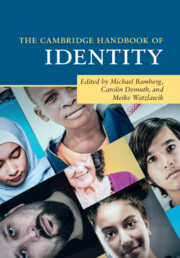Book contents
- The Cambridge Handbook of Identity
- The Cambridge Handbook of Identity
- Copyright page
- Contents
- Figures
- Tables
- Contributors
- 1 Identity: With or Without You?
- Part I The Origin and Development of the Concept of Identity
- 2 Decentering Histories of Identity
- 3 Challenges in Research on Self-Identity
- 4 The Mystery of Identity: Fundamental Questions, Elusive Answers
- Part II New Perspectives and Challenges
- Part III Methodological Approaches
- Part IV Current Domains
- Part V Where Is Identity?
- Author Index
- Subject Index
- References
4 - The Mystery of Identity: Fundamental Questions, Elusive Answers
from Part I - The Origin and Development of the Concept of Identity
Published online by Cambridge University Press: 29 October 2021
- The Cambridge Handbook of Identity
- The Cambridge Handbook of Identity
- Copyright page
- Contents
- Figures
- Tables
- Contributors
- 1 Identity: With or Without You?
- Part I The Origin and Development of the Concept of Identity
- 2 Decentering Histories of Identity
- 3 Challenges in Research on Self-Identity
- 4 The Mystery of Identity: Fundamental Questions, Elusive Answers
- Part II New Perspectives and Challenges
- Part III Methodological Approaches
- Part IV Current Domains
- Part V Where Is Identity?
- Author Index
- Subject Index
- References
Summary
That psychologists, among others, have sought to contain identity in one way or another stands to reason; it is important, at times, to get hold of what we can. It is equally important, however, to recognize and avow the existence of phenomena that resist this getting-hold and that therefore require something else, something better suited to the phenomena in question. In the case of identity, this something, I suggest, is literature, broadly conceived. In offering this perspective, I make no claims at all about the coherence or continuity of identity. Nor do I seek to specify what form of literature is required. Some identities may lend themselves to comparatively smooth beginning-middle-end tales; others, to more modern or post-modern forms; others still, perhaps, to the free verse of poetry. It all depends on the questions one asks, the person doing the questioning, and, not least, the history that precedes us, uncontainable and unnamable though it is. Whatever else identity may be, it remains something of a mystery. Rather than this being cause for despair, however, it is cause for celebration – quiet celebration, founded in the unending inspiration of what we do and cannot know about our own deepest strata.
- Type
- Chapter
- Information
- The Cambridge Handbook of Identity , pp. 77 - 98Publisher: Cambridge University PressPrint publication year: 2021
References
- 1
- Cited by

